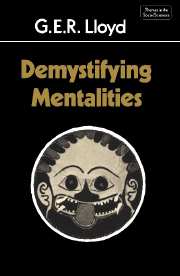Book contents
- Frontmatter
- Contents
- Note on texts and references
- Acknowledgements
- Introduction
- 1 Mentalities, metaphors and the foundations of science
- 2 Magic and science, ancient and modern
- 3 The conception and practice of proof
- 4 A test case: China and Greece, comparisons and contrasts
- Conclusion: mentalities demystified
- Notes
- Bibliography
- Index
3 - The conception and practice of proof
Published online by Cambridge University Press: 07 January 2010
- Frontmatter
- Contents
- Note on texts and references
- Acknowledgements
- Introduction
- 1 Mentalities, metaphors and the foundations of science
- 2 Magic and science, ancient and modern
- 3 The conception and practice of proof
- 4 A test case: China and Greece, comparisons and contrasts
- Conclusion: mentalities demystified
- Notes
- Bibliography
- Index
Summary
Our first two studies have explored the consequences of making the dichotomy between the literal and the metaphorical and the categories of myth and magic explicit. The argument has been that in each case, in origin, they played an important role in an ancient Greek polemic during which science and philosophy defined and legitimated themselves in contrast to the existing more traditional repositories of knowledge. Moreover the availability or otherwise of such explicit categories is one general criterion relevant to the analysis of differences within styles or modes of reasoning and argument. On the one hand there appears to be no justification, in these contexts at least, to talk either of divergent mentalities or of transformations in them. On the other the differences introduced by the use of explicit concepts of linguistic and other categories are reflected in important differences in styles of reasoning and of interpersonal exchange.
A further concept that offers a similar possible field of investigation is that of proof. The aim of the present chapter is to explore the evidence relating to the way in which that concept was first made explicit in ancient Greece, and the difference it made or the repercussions it had once it was available as an explicit concept. The practice of proof – in whatever area of thought – is of course far from confined to the Greeks, even among ancient civilisations: but the practice is one thing, having the explicit concept another.
- Type
- Chapter
- Information
- Demystifying Mentalities , pp. 73 - 104Publisher: Cambridge University PressPrint publication year: 1990



